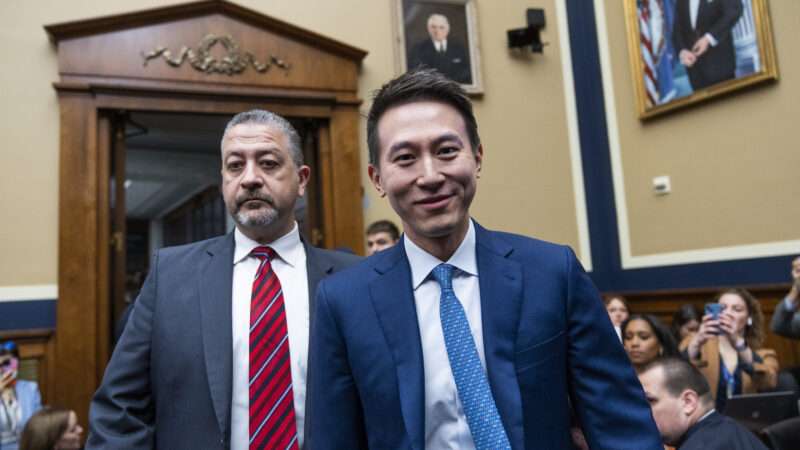
A new law banning TikTok if it doesn't divorce its parent company is "obviously unconstitutional," TikTok Inc. and ByteDance argue in a new federal court filing.
The Protecting Americans From Foreign Adversary Controlled Applications Act, passed and signed into law late last month, singles out ByteDance and its subsidiary TikTok Inc., requiring the former to divest itself of the latter within 270 days. If ByteDance doesn't, the TikTok app will be banned in the U.S.
Congress is "silencing the 170 million Americans who use [TikTok] to communicate," and "crafted a two-tiered speech regime" that is unconstitutional, TikTok argues.
The new law allows a similar ultimatum to be applied to other social media platforms with ties to "foreign adversaries" if the president deems them a threat. But this process requires at least some nominal checks and balances that don't apply in TikTok's case. And no other app or company is explicitly named in the new legislation.
"For the first time in history, Congress has enacted a law that subjects a single, named speech platform to a permanent, nationwide ban, and bars every American from participating in a unique online community with more than 1 billion people worldwide," states TikTok's petition to the U.S. Court of Appeals for the District of Columbia.
The company is asking the court to review the constitutionality of the law, which it argues is both a violation of the First Amendment and an unconstitutional bill of attainder. Bills of attainder, which regulate or punish a particular entity (without the benefit of due process), are barred by the Constitution.
TikTok also argues that the law violates its "rights under the equal protection component of the Fifth Amendment's Due Process Clause because it singles Petitioners out for adverse treatment without any reason for doing so."
An American Company With American Rights
Opponents of TikTok often argue that as a Chinese company, TikTok is afforded no free speech protections and the First Amendment doesn't apply here.
This is wrong in two ways. First, because American TikTok users have First Amendment rights which are not in question here.
Second, because TikTok Inc. is a U.S. company. It's incorporated in California and has its main office there, with additional offices in New York, San Jose, Chicago, and Miami.
TikTok Inc. is a subsidiary of ByteDance, which is incorporated in the Cayman Islands (not China) and its leadership is based in Singapore and the U.S. (not China).
ByteDance was founded in China back in 2012. But today, ByteDance's founder—a Chinese national based in Singapore—only has a 21 percent ownership stake in the company. Another 21 percent is owned by employees of the company (including around 7,000 Americans, per the petition) and 58 percent is owned by institutional investors, including BlackRock (an American company), General Atlantic (an American company), and Susquehanna International Group (headquartered in Pennsylvania).
It's hard to pin down TikTok (the platform, not the American company) as belonging to any particular nation. But the idea that it's purely a "Chinese app" is demonstrably false.
A Ban By Any Other Name
TikTok rejects the idea—often cited by politicians in support of the law—that this isn't a ban and therefore isn't actually censorship.
"Banning TikTok is so obviously unconstitutional, in fact, that even the Act's sponsors recognized that reality, and therefore have tried mightily to depict the law not as a ban at all, but merely a regulation of TikTok's ownership," notes the petition. "They claim that the Act is not a ban because it offers ByteDance a choice: divest TikTok's U.S. business or be shut down."
"But in reality, there is no choice," the company argues. "The 'qualified divestiture' demanded by the Act to allow TikTok to continue operating in the United States is simply not possible: not commercially, not technologically, not legally. And certainly not on the 270-day timeline required by the Act."
The petition lays out multiple reasons why divestiture isn't feasible, including the fact that the source code is massive and complicated, making "moving all TikTok source code development from ByteDance to a new TikTok owner…impossible as a technological matter."
"It would take years for an entirely new set of engineers to gain sufficient familiarity with the source code to perform the ongoing, necessary maintenance and development activities for the platform," states TikTok's petition. "Moreover, to keep the platform functioning, these engineers would need access to ByteDance software tools, which the Act prohibits." The petition also notes that "the Chinese government has made clear that it would not permit a divestment of the recommendation engine that is a key to the success of TikTok in the United States."
"Like the United States, China regulates the export of certain technologies originating there," notes the petition. "China's official news agency has reported that under these rules, any sale of recommendation algorithms developed by engineers employed by ByteDance subsidiaries in China, including for TikTok, would require a government license." The petition notes that "China adopted these enhanced export control restrictions between August and October 2020, shortly after President [Donald] Trump's August 6, 2020 and August 14, 2020 executive orders targeting TikTok."
No Due Process
Even if divesture could happen, the act "would still be an extraordinary and unconstitutional assertion of power," TikTok argues. It opens the door to the government simply declaring that companies they don't like must divest of particular products—including platforms for speech—or else those products will be banned. "If Congress can do this, it can circumvent the First Amendment by invoking national security and ordering the publisher of any individual newspaper or website to sell to avoid being shut down."
"By banning all online platforms and software applications offered by 'TikTok' and all ByteDance subsidiaries, Congress has made a law curtailing massive amounts of protected speech," it concludes. But "the government cannot, consistent with the First Amendment, dictate the ownership of newspapers, websites, online platforms, and other privately created speech forums."
In this case, the lawmakers' ploy to ban TikTok has been undertaken without a single non-hypothetical finding of danger by Congress, nor any consideration of less restrictive means of allaying any concerns, the company argues.
TikTok Inc. "worked with the government for four years on a voluntary basis to develop a framework to address the government's concerns," it points out. As part of this engagement, the company "voluntarily invested more than $2 billion to build a system of technological and governance protections—sometimes referred to as 'Project Texas'—to help safeguard U.S. user data and the integrity of the U.S. TikTok platform against foreign government influence."
The company also committed to a draft National Security Agreement developed with the Committee on Foreign Investment in the United States. "Congress tossed this tailored agreement aside, in favor of the politically expedient and punitive approach of targeting for disfavor one publisher and speaker (TikTok Inc.), one speech forum (TikTok), and that forum's ultimate owner (ByteDance Ltd.)," the petition states.
TikTok Inc. and ByteDance are now asking the court to "issue a declaratory judgment that the Act violates the U.S. Constitution" and an order stopping the U.S. Attorney General from enforcing the act.
More Sex & Tech News
The best technology and kids take: Sundials are ruining the Youth.
From a Roman adaptation of a Greek play, 3rd century BCE, in Kerr's "The Ordered Day" via @ewzucker pic.twitter.com/vRx9TYtKFU
— Ethan Mollick (@emollick) May 7, 2024
• Check out Reason's new Artificial Intelligence issue.
• The fight over an Idaho "abortion trafficking" law continues in a federal appeals court.
• Alabama's Attorney General "cannot constitutionally prosecute people for acts taken within the State meant to facilitate lawful out-of-state conduct, including obtaining an abortion," writes U.S. District Court Judge Myron Thompson, declining to dismiss a case against Attorney General Steve Marshall's pledge to prosecute people who help Alabama residents obtain out-of-state abortions. Reason's Emma Camp has more.
• Microsoft is building an AI tool to compete with OpenAI's ChatGPT and Google's Gemini.
• Minnesota "spends $100 million a year to detain about 750 individuals who are deemed 'likely' to commit sex offenses," notes Jacob Sullum.
Today's Image

The post TikTok Asks Court To Declare Ban Unconstitutional appeared first on Reason.com.







